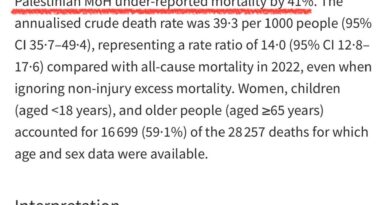US says closer than ever to ceasefire as Netanyahu and Biden meet
US says closer than ever to ceasefire as Netanyahu and Biden meet
Thu, 07/25/2024 – 21:31
The US said on Thursday that talks to reach a ceasefire in Gaza are in the “closing stages”, as President Joe Biden hosted Israeli Prime Minister Benjamin Netanyahu at the White House in Washington, DC.
Biden will press Netanyahu to reach a ceasefire deal during the two leaders’ discussions, US officials said.
“I think the message from the American side in that meeting will be that we need to get this deal over the line,” State Department spokesperson Matthew Miller said on Thursday.
Biden and Netanyahu, who have a decades-long relationship going back to when Biden was a US senator in the 1970s, were photographed in the Oval Office, with Biden’s historic decision not to seek re-election palpable in the room.
“We’ve got a lot to talk about,” Biden said.
“I want to thank you for 50 years of public service and 50 years of support for the state of Israel,” Netanyahu remarked.
This is the first time the two leaders have met in person since Biden’s visit to Israel after the 7 October Hamas-led attacks on southern Israel.
‘More fraught than ever’
The two leaders have clashed, with the US frustrated at the high number of Palestinian civilian casualties in Gaza and Netanyahu’s refusal in recent months to discuss a post-war plan for Gaza that includes the return of the US-backed Palestinian Authority to the enclave.
The meeting comes after Netanyahu vowed “total victory” against Hamas in a fiery speech on Wednesday to the US Congress.
Netanyahu was met with rapturous applause on Capitol Hill, but at least 60 US lawmakers boycotted the speech and thousands of protestors gathered in Washington to voice their ire over Israel’s offensive that has killed more than 39,000 Palestinians.
Aaron David Miller, a former Middle East negotiator for Republican and Democratic presidents, said Netanyahu’s visit comes at a time when US-Israel relations are under great “stress”.
“The bipartisan support that defined [the US-Israel] relationship is coming apart,” Miller said at an event hosted by the Middle East Institute on Thursday.
He doubts whether Netanyahu’s visit would achieve any tangible results for Israel, which continues to receive a steady supply of US weapons but is more isolated on the world stage and in the Democratic Party. Miller said it is the most fraught moment in US-Israel relations in decades.
“The Republican Party has emerged as the Israel can do no wrong party…The Democrats are deeply divided…literally debating what is the definition of being pro-Israel”.
‘Sow discord’
Netanyahu has had his share of controversial addresses to Congress.
In 2015, he irked the Obama administration by using his time addressing lawmakers to attack the US-Iran nuclear deal.
But his address on Wednesday veered into US domestic politics, where he slammed pro-Palestinian demonstrators as “useful idiots” for Iran, and citing a senior US official, he suggested Tehran could be instigating the protests though he provided no evidence.
In a reflection of the divide inside the Democratic Party, White House spokesperson John Kirby supported Netanyahu’s claim, while distancing himself from the Israeli leader’s blunt language.
“We know that Iran certainly has tried to meddle here. They’ve tried to sow discord. They’ve obviously contributed to some funding of some protesters,” Kirby said.
Ceasefire during Knesset recess?
While Biden is now a lame-duck President, sealing a ceasefire deal would still represent a victory for his administration, just as Vice President Kamala Harris gears up to take on Donald Trump in the November 2024 elections.
Kirby said that gaps remain in the negotiations but that “we are closer now than we’ve been before” to a ceasefire deal between Hamas and Israel.
Ceasefire talks have dragged on for months, with Hamas wary of reaching an agreement with Israel that does not guarantee a permanent end to the fighting.
Netanyahu’s government has said it reserves the right to continue its war after the hostages are released, but is under pressure from members of Iran’s so-called “axis of resistance”. Israel is trading near-daily fire with Hezbollah in Lebanon. Last week, a drone fired by the Houthis in Yemen hit Tel Aviv, killing one Israeli and injuring others.
David Schenker, a former senior US official now at the Washington Institute for Near East Policy, said that Netanyahu’s visit is unlikely to change the dynamics on the battlefield, but said a ceasefire may be closer.
“My guess is a ceasefire will happen in the coming weeks, after the Knesset goes into recess,” he said, adding that the timing could “insulate” Netanyahu from a vote of no-confidence or other shows of no-confidence from his far-right government allies who are opposed to a truce.
In his speech to Congress, Netanyahu discussed efforts to secure the release of hostages but did not mention any progress on a ceasefire.



